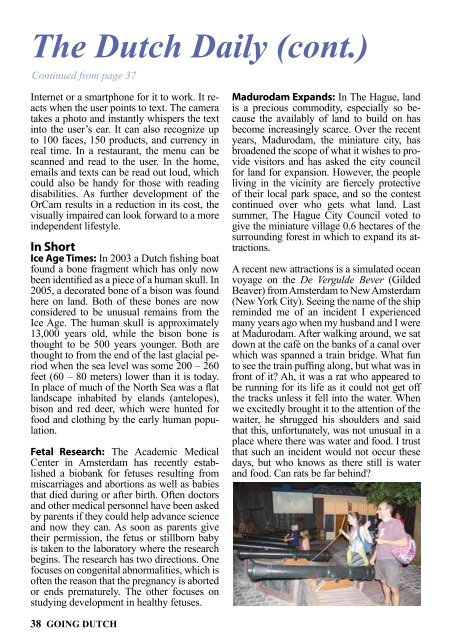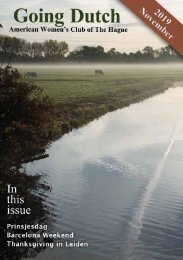AWC April 2018 Going Dutch
American Women's Club of The Hague magazine April 2018
American Women's Club of The Hague magazine April 2018
Create successful ePaper yourself
Turn your PDF publications into a flip-book with our unique Google optimized e-Paper software.
The <strong>Dutch</strong> Daily (cont.)<br />
Continued from page 37<br />
Internet or a smartphone for it to work. It reacts<br />
when the user points to text. The camera<br />
takes a photo and instantly whispers the text<br />
into the user’s ear. It can also recognize up<br />
to 100 faces, 150 products, and currency in<br />
real time. In a restaurant, the menu can be<br />
scanned and read to the user. In the home,<br />
emails and texts can be read out loud, which<br />
could also be handy for those with reading<br />
disabilities. As further development of the<br />
OrCam results in a reduction in its cost, the<br />
visually impaired can look forward to a more<br />
independent lifestyle.<br />
In Short<br />
Ice Age Times: In 2003 a <strong>Dutch</strong> fishing boat<br />
found a bone fragment which has only now<br />
been identified as a piece of a human skull. In<br />
2005, a decorated bone of a bison was found<br />
here on land. Both of these bones are now<br />
considered to be unusual remains from the<br />
Ice Age. The human skull is approximately<br />
13,000 years old, while the bison bone is<br />
thought to be 500 years younger. Both are<br />
thought to from the end of the last glacial period<br />
when the sea level was some 200 – 260<br />
feet (60 – 80 meters) lower than it is today.<br />
In place of much of the North Sea was a flat<br />
landscape inhabited by elands (antelopes),<br />
bison and red deer, which were hunted for<br />
food and clothing by the early human population.<br />
Fetal Research: The Academic Medical<br />
Center in Amsterdam has recently established<br />
a biobank for fetuses resulting from<br />
miscarriages and abortions as well as babies<br />
that died during or after birth. Often doctors<br />
and other medical personnel have been asked<br />
by parents if they could help advance science<br />
and now they can. As soon as parents give<br />
their permission, the fetus or stillborn baby<br />
is taken to the laboratory where the research<br />
begins. The research has two directions. One<br />
focuses on congenital abnormalities, which is<br />
often the reason that the pregnancy is aborted<br />
or ends prematurely. The other focuses on<br />
studying development in healthy fetuses.<br />
Madurodam Expands: In The Hague, land<br />
is a precious commodity, especially so because<br />
the availably of land to build on has<br />
become increasingly scarce. Over the recent<br />
years, Madurodam, the miniature city, has<br />
broadened the scope of what it wishes to provide<br />
visitors and has asked the city council<br />
for land for expansion. However, the people<br />
living in the vicinity are fiercely protective<br />
of their local park space, and so the contest<br />
continued over who gets what land. Last<br />
summer, The Hague City Council voted to<br />
give the miniature village 0.6 hectares of the<br />
surrounding forest in which to expand its attractions.<br />
A recent new attractions is a simulated ocean<br />
voyage on the De Vergulde Bever (Gilded<br />
Beaver) from Amsterdam to New Amsterdam<br />
(New York City). Seeing the name of the ship<br />
reminded me of an incident I experienced<br />
many years ago when my husband and I were<br />
at Madurodam. After walking around, we sat<br />
down at the café on the banks of a canal over<br />
which was spanned a train bridge. What fun<br />
to see the train puffing along, but what was in<br />
front of it? Ah, it was a rat who appeared to<br />
be running for its life as it could not get off<br />
the tracks unless it fell into the water. When<br />
we excitedly brought it to the attention of the<br />
waiter, he shrugged his shoulders and said<br />
that this, unfortunately, was not unusual in a<br />
place where there was water and food. I trust<br />
that such an incident would not occur these<br />
days, but who knows as there still is water<br />
and food. Can rats be far behind?<br />
38 GOING DUTCH

















